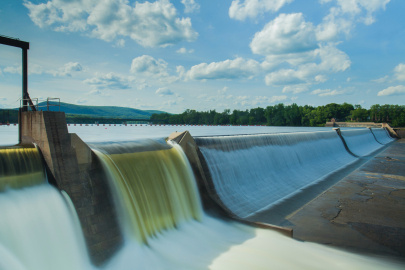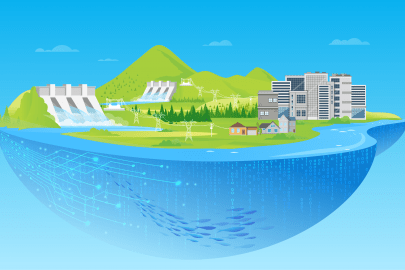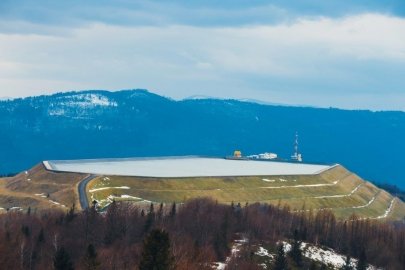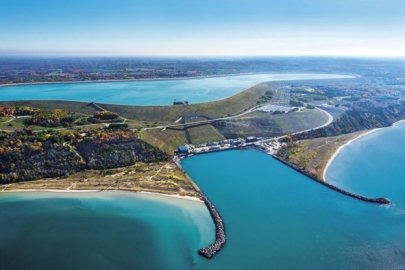A study on the sustainability of closed-loop pumped storage hydropower identified the technology as a promising solution to grid-scale energy storage.
Water Power Technologies Office
March 1, 2023Grid Reliability, Resilience, & Integration (HydroWIRES)
Project Name: Life Cycle Assessment of Pumped Hydropower Storage
Project Team: National Renewable Energy Laboratory (lead), Argonne National Laboratory, and representatives from industry and academia
Lead Recipient Location: Golden, Colorado

Published in August 2022, the Life Cycle Assessment for Closed-Loop Pumped Hydropower Energy Storage in the United States study explores the potential environmental impacts of new closed-loop pumped storage hydropower (PSH) projects in the United States compared to other energy storage technologies. The authors, who are from the National Renewable Energy Laboratory, compared data on PSH and alternative energy storage options and found that across many future energy scenarios and grid mixes, PSH plants contribute the least to global warming potential.
This study is the first to examine the full life cycle of new closed-loop PSH projects—from resource extraction through operation and on to end-of-life material recovery (or disposal)—focusing on greenhouse gas emissions. Such data can help industry build investor confidence by demonstrating that PSH can be a valuable and sustainable addition to tomorrow’s clean energy grid. Before this study, relatively little was known about the environmental impacts of constructing new, closed-loop PSH plants. Now, the team’s findings could help stakeholders strategize how to sustainably grow the industry.
For example, though the team based its research on a plant with an 80- to 100-year lifespan, the results represent a range of potential plant specifications and geographic locations. And larger plants, according to the study, could have lower overall lifetime carbon emissions. Developers can use this data to accurately assess their proposed plant’s emissions, and the results could help inform decision making about future investments in new closed-loop PSH projects versus other energy storage technologies. A Technical Review Committee, which included nine representatives from industry and academia, as well as Argonne National Laboratory, provided valuable guidance to the report’s authors and contributed advice on data sources, assumptions, modeling approach, and dissemination to stakeholders.
Grid Reliability, Resilience, & Integration (HydroWIRES) Projects
-
 A General Electric Research-led team demonstrated a new hydropower turbine design and monitoring methodology that allows plant operators to adjust power output in a few seconds to meet energy demand without needing to start or stop units.
A General Electric Research-led team demonstrated a new hydropower turbine design and monitoring methodology that allows plant operators to adjust power output in a few seconds to meet energy demand without needing to start or stop units. -
 WPTO launched the H2Os Prize, and innovators competed in two prize phases and developed new solutions that can help advance hydropower’s contributions to the grid.
WPTO launched the H2Os Prize, and innovators competed in two prize phases and developed new solutions that can help advance hydropower’s contributions to the grid. -
 Two national laboratory studies found opportunities to expand and innovate pumped storage hydropower in the United States.
Two national laboratory studies found opportunities to expand and innovate pumped storage hydropower in the United States. -
 Analyses from Argonne National Laboratory and Pacific Northwest Laboratory help hydropower operators and developers better understand how hydropower facilities can integrate and be profitable on the changing electricity grid.
Analyses from Argonne National Laboratory and Pacific Northwest Laboratory help hydropower operators and developers better understand how hydropower facilities can integrate and be profitable on the changing electricity grid. -
 A new optimization model for pumped storage hydropower can help grid operators decide how to distribute a facility’s time between generating power and pumping water to store energy.
A new optimization model for pumped storage hydropower can help grid operators decide how to distribute a facility’s time between generating power and pumping water to store energy.
WPTO's Hydropower e-newsletter features news on R&D and applied science to advance sustainable hydropower and pumped-storage technologies.
The WPTO e-newsletter brings funding opportunities, events, publications, hydropower, and marine energy updates directly to your inbox.


